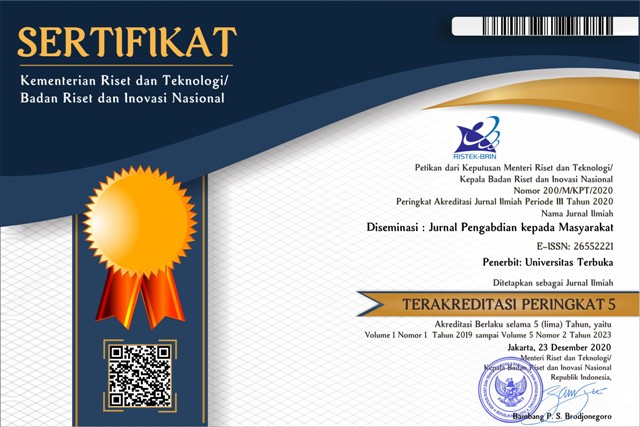PELATIHAN PENERAPAN PENDEKATAN STEM DALAM PEMBELAJARAN TEMATIK INTEGRATIF BAGI GURU SEKOLAH DASAR ISLAM DI SURAKARTA
DOI:
https://doi.org/10.33830/diseminasiabdimas.v4i1.1961Keywords:
elementary school, integrative thematic learning, pembelajaran tematik integratif, pendekatan STEM, sekolah dasar, STEM approachAbstract
The government, parents, teachers must realize that the world of education is changing. Science, Technology, Engineering, and Mathematics (STEM) are interrelated subjects in human life. Most of the teachers at SD Djama'atul Ichwan Program Utama Surakarta admitted that they did not understand and had not been able to apply the STEM approach in integrative thematic learning so that there was a need for training on the STEM approach in integrative thematic learning. The goal to be achieved from this service program is to provide understanding and skills to apply the STEM approach in integrative thematic learning. The method of implementing the service includes: (1) The method of approach carried out starting from the survey, licensing, and providing motivation for teachers who will take part in the training; (2) The method of implementing the program, including the preliminary stage, the stage of socialization and hearings, the training stage, and the final evaluation stage. The results of the analysis of the teacher's response questionnaire to service activities indicate that teachers believe that the service provides benefits for the development of educational activities in schools, training materials for the application of the STEM approach in integrative thematic learning are in great demand and needed by teachers in the development of 21st-century learning and the 4.0 industrial revolution, and teachers feel the benefits of service activities because they can become new scientific insights in the development of learning activities in schools.
Pemerintah, orang tua, guru harus menyadari bahwa dunia pendidikan sangat berubah. Science, Technology, Engineering, and Mathematic (STEM) merupakan mata pelajaran yang saling berkaitan dalam kehidupan manusia. Sebagian besar guru di SD Djama’atul Ichwan Program Utama Surakarta mengaku belum memahami dan belum mampu menerapkan pendekatan STEM dalam pembelajaran tematik integrative sehingga perlu adanya pelatihan tentang pendekatan STEM dalam pembelajaran tematik integratif. Tujuan yang hendak dicapai dari program pengabdian ini adalah memberikan pemahaman dan keterampilan menerapkan pendekatan STEM dalam pembelajaran tematik integratif. Metode pelaksanaan pengabdian meliputi: (1) Metode pendekatan yang dilakukan mulai tahap survei, perijinan, dan pemberian motivasi bagi guru yang akan mengikuti pelatihan; (2) Metode pelaksanaan program, meliputi tahap pendahuluan, tahap sosialisasi dan audiensi, tahap pelatihan, serta tahap evaluasi akhir. Hasil analisis terhadap kuesioner tanggapan guru terhadap kegiatan pengabdian menunjukkan bahwa guru meyakini bahwa adanya pengabdian memberikan manfaat bagi berkembangnya kegiatan pendidikan di sekolah, materi pelatihan penerapan pendekatan STEM dalam pembelajaran tematik integratif sangat diminati dan dibutuhkan guru dalam pengembangan pembelajaran abad 21 dan revolusi industri 4.0, dan guru merasakan manfaat kegiatan pengabdian karena dapat menjadi wawasan keilmuan baru dalam pengembangan kegiatan pembelajaran di sekolah.
References
Fatmawati, L., Erviana, V. Y., & Maryani, I. (2019). Pelatihan dan Pendampingan Guru SD dalam Pengembangan Media Pembelajaran Berbasis STEM di PCM Kalasan. Seminar Nasional Hasil Pengabdiankepada Masyarakat Universitas Ahmad Dahlan. 243-251.
Hussin, A. A. (2018). Education 4.0 made simple: ideas for teaching. International Journal of Education & Literacy Studies, 6(3), 92-98.
Ismayani, A. (2016). Pengaruh Penerapan STEM Project Based Learning Terhadap Kreativitas Matematis Siswa SMK. Indonesian Digital Journal og Mathematics and Education, III(4), 264-272.
Isriwal, P. A., Firman, F., & Rusdinal, R. (2019). Kompetensi Guru: Dalam Mewujudkan Generasi Berkarakter dan Terampil di Era 4.0. Jurnal Pendidikan Tambusai, 3(3), 1627-1632.
Kagermann, H., Lukas, W. D., & Wahlster, W. (2013). Recommendations for Implementing The Strategic Initiative Industrie 4.0. Industrie 4.0 Working Droup, II(6), 24-57.
Permanasari, A. (2016). STEM Education: Inovasi dalam Pembelajaran Sains. Prosiding Seminar Nasional Sains, 1(1), 23-34.
Stearns, P. N. (2013). The Industrial Revolution in World History (4th ed.). USA: Westview Press.
Sukmana, R. W. & Nurhayati, Y. (2019). Pengabdian kepada Masyarakat Pembelajaran Berbasis STEM Bagi Guru - Guru Sekolah Dasar di Kabupaten Bandung. Jurnal Pengabdian Tri Bakti, 1(1): 1-4.
Sunarno, W. (2018). Pembelajaran IPA di Era Revolusi Industri 4.0. Makalah Utama dalam Seminar Nasional Pendidikan Fisika IV 2018 di Universitas PGRI Madiun Tanggal 25 Juli 2018.
Torlakson. (2014). A Blueprint for STEM In California Public Education.
Williams, J. (2011). STEM Education: Proceed with caution. Design and Technology Education: An International Journal, 16 (1) : 26-35
Zhou, K., Taigang, L., & Lifeng, Z. (2015). Industry 4.0: Towards Future Industrial Opportinities and Challenges. IEEE 12th International Conference, I(1), 2147-2152.
Downloads
Published
Issue
Section
License
Copyright and Licensing

Diseminasi : Jurnal Pengabdian kepada Masyarakat is licensed under a Creative Commons Attribution-NonCommercial-NoDerivativeWorks 4.0 International License. Allows users to copy and distribute the Article, provided this is not done for commercial purposes and further does not permit distribution of the Article if it is changed or edited in any way, and provided the user gives appropriate credit (with a link to the formal publication through the relevant DOI), provides a link to the license, and that the licensor is not represented as endorsing the use made of the work.















